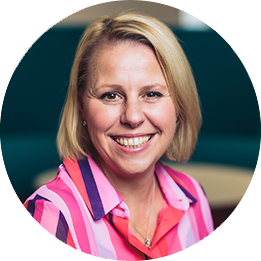A house is normally the biggest purchase you will ever make, and taking that first giant step onto the housing ladder requires some serious saving.
There are products like Lifetime ISAs that can help you on your journey, but for some people it can be an uphill struggle. Clare Seal started the Instagram account MyFrugalYear to document her battle to escape from debt – and after writing three books, she and her partner have just bought a house. Here is Clare’s account of that journey.
From debt to deposit
On the morning of 17 June 2022, my husband and I sat in a café, making small talk and sipping lattes, our nerves tingling. Then, my phone rang. ‘Good news – you’ve completed! Your developer will be in touch about picking up the keys very soon,’ said the legal secretary on the other end of the line. People looked up from their laptops as we both cheered, but we didn’t care.
Just three short years ago, the idea of home ownership seemed more than far-fetched for us. After over a decade of financial turbulence, we were more than £27,000 in the red, and our financial difficulties were a huge cause of stress and worry. The holes in our budget felt unfillable, and we were close to breaking point.
In March of 2019, we finally turned a corner. With a little help from an anonymous Instagram account, I started working through my issues with money, finally seeking out the skills and education that we needed to start rebuilding. That structure allowed us to take advantage of an increase in our income in the form of a pay rise and a decrease in our outgoings as our eldest child finally started school and, slowly at first, we started to chip away at our debt.
Just over three years later, we stood in the kitchen of our brand new home, keys in hand. If you have debt, and home ownership feels like a pipe dream, it can be easy to write yourself off – but don’t! I’m so glad we didn’t – and here are a few of the things that helped us to get here:
Arm yourself with all of the info
The first step on any financial journey has to be finding out the lay of the land, so arm yourself with all of the information. How much exactly do you owe, what are the interest rates and who do you owe it to? How much space do you have in your budget for repayments? What are house prices like in the place where you’d like to buy, and what’s your affordability for a mortgage?
This research stage is critical to making a good plan, so don’t skip it.
Make a plan, but give it some flex
Once you have all of the information that you need, you can start to put together a plan. How much are you going to put towards your debt each month? If you have multiple credit accounts, which are you going to focus on first?
Alongside your plan to pay off your debt, I’d recommend having a solid budget, which you check in with regularly.
Stay accountable
If you’re working on this goal as part of a couple, make sure that you talk regularly about your progress and stay accountable to one another. If you’re on this journey alone, it might help to choose a trusted friend or family member as an ‘accountability buddy’ – someone who will check in with you regularly on your goals and help you to stay motivated.
Don’t obsess over timelines – the time will pass anyway
One of the reasons people often grow demotivated when aiming to make a huge change is they focus only on the end goal, not on living life in the meantime. This can lead to feeling frustrated and impatient, then slipping up and reverting to old habits.
Try not to focus too hard on how long it’s taking – just continue your hard work, celebrate the milestones along the way and continue to find joy in life in the meantime.
Develop good financial habits, and keep them going
Motivation is great, but it can be fickle and short-lived. Your mood, or even how tired or hungry you are, can affect how motivated you feel, so it’s not wise to rely on motivation alone to power you throughout your journey. Instead, look to build solid financial habits, and automate as much as you possibly can in order to relieve a little of that mental load.
Once those habits are there – particularly making regular repayments – they can easily be transferred from one goal to the next. For example, once you’ve finished clearing your debt, you can re-allocate that money into house deposit savings without feeling the difference.
Negotiate, negotiate, negotiate
Having bought a new build, negotiating on house prices is not something I can give tips on, but ahead of finding a place to buy, you can definitely look to negotiate your salary and/or rates as a freelancer. Reviewing my rates regularly and not compromising on fees allowed me to save far more quickly. Similarly, my husband’s negotiation of his salary improved both our cash position and our mortgage affordability in the eyes of lenders.
Keep an eye on your credit score
Lots of advice about paying off debt involves balance transfers and switching bank accounts to take advantage of bonuses and favourable rates. Though this can be helpful, be cautious about chopping and changing too much ahead of any mortgage application, especially if you think you might apply within the next two years. Make sure that you always make credit card and loan payments on time, and be careful with other forms of debt like buy now, pay later.
Credit scores can be fickle and slow to improve, so be patient and careful.
Get a great mortgage broker
If you’ve recently had debt, or your credit report is less than perfect, finding a good broker could be the difference between getting a decent mortgage and a terrible one – or even getting a mortgage at all. Find someone who you trust, and who has access to the whole of the market.
Keep faith
It can feel like a long slog at times, and the UK housing market has never felt so impenetrable, but if home ownership is something that you really want, it’s important to hold onto the belief that you can do it. I’m so glad that we did.
To hear more about Clare’s journey, take a listen to our podcast: The ultimate guide to saving for a house deposit.
Author: Clare Seal is the creator of the My Frugal Year Instagram account, founder of The Financial Wellbeing Forum and author of Real Life Money (Headline 2020) and The Real Life Money Journal (Headline 2020). She is also a certified financial coach, corporate consultant and speaker.
Biography: Clare works to address the deeper causes of debt and financial difficulty, discussing how mindset, privilege and circumstances contribute to our financial lives and emotional wellbeing, giving guidance on how we can resolve money worries for good.
The @myfrugalyear Instagram community was founded in March 2019, and has grown a following of over 100,000 people. It mixes practical financial tips with mental health and emotional wellbeing content.
Remember that the value of investments can change, and you could lose money as well as make it. How you're taxed will depend on your circumstances, and tax rules can change. Tax and LISA rules apply.
A Lifetime ISA isn't for everyone. If you withdraw money before age 60, unless it's to buy your first home, you'll pay a government withdrawal charge of 25%. And if you choose to save in a Lifetime ISA instead of enrolling in, or contributing to, your workplace pension scheme, you'll miss out on your employer’s contributions. Your current and future entitlement to means-tested benefits may also be affected.
These articles are for information purposes only and are not a personal recommendation or advice.



